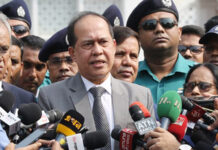
A large number of law enforcers escort ‘Mangal Shovajatra’ brought out from the fine arts faculty premises on Dhaka University campus to welcome Pahela Baishakh, the first day of Bengali New Year 1424, on Friday. — Sanaul Haque
Fanfare, festivity and enthusiasm marked the celebrations of Pahela Baishakh, the first day of Bengali New Year 1424, on Friday amid restrictions imposed by law enforcers, especially in the capital.
The day was celebrated across the country with a vow to build a non-sectarian, happy and prosperous Bangladesh curbing all evil forces.
Dhaka University’s ‘Mangal Shovajatra’ was held amid unprecedented police escort as police had earlier said it would be done to ensure security and to prevent outsiders to enter into the procession.
The police used ropes surrounding the procession to maintain its ‘order’.
A good number of people, mostly women along with their children, who had bags with them had to go back to their homes without enjoying programmes at Ramna Park and DU area, the main attraction of the Pahela Baishakh celebrations in the capital.
This year, the procession, hailing wellbeing, was held for the first time after it was declared an intangible cultural heritage by UNESCO in late 2016, categorised on the representative list as a heritage of humanity.
A number of DU students said the presence of people in Mangal Shokajatra was the lowest in the past several years.
DU unit president of Bangladesh Students’ Union Tuhin Kanti Das told New Age that he attended Mangal Shovajatra for the past seven years and the Friday’s presence was almost half of that of the previous years.
He blamed harassing security system, execution of Harkat-ul-Jihad top leader Mufti Hannan only two days before the celebrations, government attitude towards Hefazat-e-Islam and removing sculpture from the Supreme Court premises created panic among the city dwellers.
While visiting a temporary police checkpoint near National Press Club around 8:30am, it was seen that a number of people, mostly women with their children and bags, had been requesting police personnel to allow them to cross the checkpoint after their bags were checked. None carrying bags were, however, allowed to cross the checkpoint.
‘I took two fruits, a bottle of water and a T-shirt in my vanity bag for my two-and-a-half-year-old son as I planned to stay on the university campus until noon. Police did not allow us to go with the bag while my son was crying to go,’ said Champa Das, a resident from Basabo in the city.
Though there were restrictions on outdoor programmes after 5:00pm, many celebrators were, however, seen at different venues after the time.
Hundreds of people thronged the streets and different popular places in the capital and elsewhere in the country as they welcomed the Bengali New Year with colourful processions, songs and fairs, beginning at dawn. Besides, businesses started the day with a new ledger, closing the past one.
The main venues of the celebrations in Dhaka were Ramna Park, DU, Rabindra Sarobar and Bangabandhu International Convention Centre.
In the capital, the day’s programme began with artistes of Chhayanaut rendering songs at Ramna Batamul at sunrise.
People gathered at the venue amid heightened security. Cultural organisation Chhayanaut has been holding the music soiree there since 1965 and still remains the focal point of the celebrations.
Men in traditional pajama and punjabi and women in white and red saris joined the celebrations along with children in colourful attires. They also relished Bengali delicacy of panta bhat.
The celebrations peaked in the afternoon with crowds of people thronging different popular and historic spots in Dhaka and elsewhere.
Cultural organisation Surer Dhara and private television channel Channel i jointly organised a programme at Bangabandhu International Conference Centre at dawn.
The Ministry of Cultural Affairs, Bangla Academy, Shilpakala Academy, Sammilita Sangskritik Jote, Bangabandhu Sangskritik Jote, Bangladesh Shishu Academy, Jatiya Press Club, Dhaka Reporters’ Unity and different organisations celebrated the day with festivity in the capital.
Besides, Pahela Baishakh was also celebrated in Chittagong, Khulna, Rajshahi, Sylhet, Barisal, and Rangpur divisional headquarters, and all other districts with fairs and cultural programmes, reported New Age correspondents.
President Abdul Hamid, prime minister Sheikh Hasina, Bangladesh Nationalist Party chairperson Khaleda Zia and leader of the opposition in parliament Raushan Ershad in separate messages greeted the nation on the occasion.
All public and private radio and televisions aired special programmes while newspapers published special supplements. The day was a public holiday.
Source: New Age









